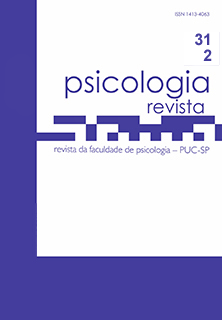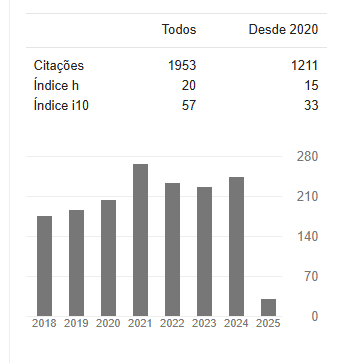Evaluation of family financial socialization
an integrative literature review
DOI:
https://doi.org/10.23925/2594-3871.2022v31i2p358-384Keywords:
Family Financial Socialization, Family Relationships, Economic PsychologyAbstract
The aim of this study was to conduct an integrative review of the literature on Family Financial Socialization (FFS) from the perspectives of psychology and family relationships. To understand how FFS is defined and measured, the review followed the recommendations of the PRISMA Method. A search was conducted for scientific articles with a quantitative design in English, Portuguese, and Spanish, published between 2010 and 2020 in the Scopus, PsychNET, Web of Science, Science Direct, Redalyc, Lilacs, Pepsic, Scielo and Ebscohost databases. The results showed a prevalence of studies carried out in the USA with an adult population and an individual perspective. No Brazilian studies were found. It is concluded that FFS is associated with important outcomes in adulthood, but there is still a lack of instruments for measuring the construct, as well as important gaps in understanding and evaluating aspects that compose the implicit dimension of FFS.
References
Agnew, S. (2018). Empirical measurement of the financial socialization of children by parents. Young Consumers, 19(4), 421-431. doi:10.1108/yc-07-2017-00717
Alhabeeb, M. J. (2002). On the development of consumer socialization of children. Academy of Marketing Studies Journal, 6(1), 9-14.
Barton, A. W., & Bryant, C. M. (2016). Financial strain, trajectories of marital processes, and African American newlyweds’ marital instability. Journal of Family Psychology, 30(6), 657–664. doi:10.1037/fam00 00190
Batista-Foguet, J. M., Coenders, G., & Alonso J. (2004). Análisis Fatorial Confirmatória: Su utilidad em la validación de Cuestionarios relacionados a la salud. MedClin(Barc), 122, 21-27.
Bauer, M. W. (2008). Análise de conteúdo clássica: uma revisão. In Bauer, M. W., Gaskell, G. (Eds), Pesquisa qualitativa com texto, imagem e som: um manual prático (pp 189-217). Petrópolis, RJ: Vozes.
Bessa, S., Fermiano, M.B., & Denegri, M.C. (2014). Compreensão econômica de estudantes entre 10 e 15 anos. Psicologia e Sociedade, 26(2), 410-419. doi: 10.1590/S0102-71822014000200017
Borsa, J. C., Damásio, B. F., & Bandeira, D. R. (2012). Adaptação e validação de instrumentos psicológicos entre culturas: algumas considerações. Paidéia, 22(53), 423-432. doi: 10.1590/S0103-863X2012000300014
Botelho, L. L. R., Cunha, C. C. A., & Macedo, M. (2011). O método da revisão integrativa nos estudos organizacionais. Gestão e Sociedade, 5(11), 121–136. doi: 10.21171/ges.v5i11.1220
Brasil. Presidência da República (2020). Medida Provisória nº 919, de 30 de janeiro de 2020. Recuperado de: https://pesquisa.in.gov.br/imprensa/jsp/visualiza/index.jsp?data=31/01/2020&jornal=515&pagina=1
Bronfenbrenner, U., Arastah, J., Hetherington, M., Lerner, R., Mortimer, J. T., Pleck, J. H., … Slaughter, D. (1986). Ecology of the Family as a Context for Human Development: Research Perspectives. Developmental Psychology, 22(6), 723-742.
Carter, B. & McGoldrick, M. (1995). As mudanças no ciclo de vida familiar. Porto Alegre, RS: Artes Médicas.
Cho, S. H., Gutter, M., Kim, J., & Mauldin, T. (2012). The effect of socialization and information source on financial management behaviors among low- and moderate-income adults. Family and Consumer Sciences Research Journal, 40(4), 417–430. doi:10.1111/j.1552-3934.2012.02120.x
Chowa, G. A. N., & Despard, M. R. (2014). The influence of parental financial socialization on youth’s financial behavior: evidence from Ghana. Journal of Family and Economic Issues, 35(3), 376–389. doi:10.1007/s10834-013-9377-9
Confederação Nacional do Comércio de Bens e Turismo [CNC]. (2020). Pesquisa de Endividamento e Inadimplência do Consumidor – PEIC. Recuperado de: http://cnc.org.br/sites/default/files/2020-09/An%C3%A1lise%20Peic%20-%20agosto%20de%202020.pdf
Curran, M. A., Parrott, E., Ahn, S. Y., Serido, J., & Shim, S. (2018). Young adults’ life outcomes and well-being: perceived financial socialization from parents, the romantic partner, and young adults’ own financial behaviors. Journal of Family and Economic Issues, 39(3), 445–456. doi:10.1007/s10834-018-9572-9
Danes, S. M. (1994). Parental perceptions of children’s financial socialization. Financial Counseling and Planning, 5, 127–149.
D’Aquino, C. (2008). Educação financeira: como educar seus filhos. Rio de Janeiro: Elsevier.
Deller, S., & Parr, J. (2021). Does student loan debt hinder community well-being?. International Journal of Community Well-Being, 4, 263-285 doi:10.1007/s42413-020-00107-1
Fitzsimmons, V. S., Hira, T. K., Bauer, J. W., & Hafstrom, J. L. (1993). Financial management: development of scales. Journal of Family and Economic Issues, 14(3), 257–274. doi:10.1007/BF01022180
Furnham, A., Wilson, E., & Telford, K. (2012). The meaning of money: the validation of a short money-types measure. Personality and Individual Differences, 52 (6), 707–711. doi:10.1016/j.paid.2011.12.020
Gąsiorowska, A. (2007). Postawy wobec pieniędzy u rodziców i ich dzieci. O rolipierwotnej socjalizacji ekonomicznej w kształtowaniu stosunku do pieniędzy.[Parents’and children’s attitudes towards money. The role of primary economic socialization in shaping attitudes to money].Psychologia Edukacja ISpołeczeństwo, 4(3), 245–260.
Grohmann, A., Kouwenberg, R., & Menkhoff, L. (2015). Childhood roots of financial literacy. Journal of Economic Psychology, 51, 114–133. doi: 10.1016/j.joep.2015.09.002
Grusec, J. E., & Hastings, P. D. (2015). In J. E. Grusec & P. D. Hastings (Eds.), Handbook of socialization: Theory and research (pp. 11–12). New York: Guilford Press.
Gudmunson, C. G., & Danes, S. M. (2011). Family financial socialization: theory and critical review. Journal of Family and Economic Issues, 32(4), 644-677. doi:10.1007/s10834-011
Gutter, M. S., Garrison, S., & Copur, Z. (2010). Social learning opportunities and the financial behaviors of college students. Family and Consumer Sciences Research Journal, 38(4), 387–404. doi:10.1111/j.1552-3934.2010.00034.x
Hameister, B. R., Barbosa, P. V., & Wagner, A. (2015). Conjugalidade e parentalidade: uma revisão sistemática do efeito spillover. Arquivos Brasileiros de Psicologia, 67(2), 140-155. Recuperado de: http://pepsic.bvsalud.org/scielo.php?script=sci_arttext&pid=S180952672015000200011&lng=pt&tlng=pt
Jin, N., & Chen, Z. (2019). Comparing financial socialization and formal financial education: Building financial capability. Social Indicators Research, 149(1), 641-656. doi: 10.1007/s11205-019-02248-z
Jorgensen, B. L., Rappleyea, D. L., Schweichler, J. T., Fang, X., & Moran, M. E. (2017). The financial behavior of emerging adults: a family financial socialization approach. Journal of Family and Economic Issues, 38(1), 57–69. doi:10.1007/s10834-015-9481-0
Jorgensen, B. L., & Savla, J. (2010). Financial literacy of young adults: The importance of parental socialization. Family Relations, 59(4), 465–478. doi:10.1111/j.1741-3729.2010.00616.x
Kagotho, N., Nabunya, P., Ssewamala, F., Mwangi, E. N., & Njenga, G. (2017). The role of family financial socialization and financial management skills on youth saving behavior. Journal of Adolescence, 59, 134–138. doi: 10.1016/j.adolescence.2017.05.013
Kim, J. H., & Torquati, J. (2019). Financial socialization of college students: domain-general and domain-specific perspectives. Journal of Family and Economic Issues, 40(2), 226-236. doi:10.1007/s10834-018-9590-7
Lanz, M., Sorgente, A., & Danes, S. M. (2019). Implicit family financial socialization and emerging adults’ financial well-being: a multi-informant approach. Emerging Adulthood, 8(6), 443-452. doi:10.1177/2167696819876752
Lauer-Leite, I. D., Magalhães, C. M. C., Lordelo, E. R., & Lelis, I. L. (2010). Socialização econômica: conhecendo o mundo econômico das crianças. Estudos de Psicologia, 15(2), 145-152. doi: 10.1590/S1413-294X2010000200003
Lunt, P. (1996). Discourses of savings. Journal of Economic Psychology, 17, 677-690.
Lusardi, A., Mitchell, O. S., & Curto, V. (2010). Financial literacy among the young. The Journal Of Consumer Affairs, 44(2), 358-380. doi:10.1111/j.1745-6606.2010.01173.x .
Mandell, L. (2008). Financial literacy of high school students. In Xiao, J. J. (Ed.),Handbook of consumer finance research (pp. 163–184). New York: Springer
Minuchin, S. (1990). Famílias, funcionamento e tratamento. Porto Alegre, RS: Artes Médicas.
Moher, D., Liberati, A., Tetzlaff, J., Altman, D. G., Tugwell, P. (2009). Preferred reporting items for systematic reviews and meta-analyses: the PRISMA statement. PLoS Medicine. doi: 10.1371/journal.pmed.1000097
Moreno-Herrero, D., Salas-Velasco, M., & Sánchez-Campillo, J. (2018). Factors that influence the level of financial literacy among young people: the role of parental engagement and students’ experiences with money matters. Children and Youth Services Review, 95, 334–351. doi:10.1016/j.childyouth.2018.10.042
Norvilitis, J. M., & MacLean, M. G. (2010). The role of parents in college students’ financial behaviors and attitudes. Journal of Economic Psychology, 31(1), 55–63. doi 10.1016/j.joep.2009.10.003
OECD/INFE (2015). National strategies for financial education: OECD / INFE Policy Handbook. Paris: OECD Publishing.
Otto, A. M. C. (2009). The Economic Psychology of Adolescent Saving (Tese de doutorado, Universidade de Exeter, Bristol, Inglaterra). Recuperado de: https://ore.exeter.ac.uk/repository/bitstream/handle/10036/83873/OttoA.pdf.
Otto, A. (2013). Saving in childhood and adolescence: Insights from developmental psychology. Economics of Education Review, 33, 8–18. doi:10.1016/j.econedurev.2012.09.005
Palaci, F., Jiménez, I., & Topa, G. (2017). Economic cognitions among older adults: parental socialization predicts financial planning for retirement. Frontiers in Aging Neuroscience, 9(21), 376-390. doi:10.3389/fnagi.2017.00376
Papalia, D. E., Olds, S. W., & Feldman, R. D. (2010) Desenvolvimento humano. São Paulo, SP: McGraw-Hill.
Robertson-Rose, L. (2020). Because my father tolde me to: exploratory insights into parental influence on the retirement savings behavior of adult and children. Journal of Family and Economic Issues, 41(2), 364-376. doi:10.1007/s10834-019-09643-1
Romo, L. K. (2011). Money talks: revealing and concealing financial information in families. Journal of Family Communication, 11(4), 264–281. doi: 10.1080/15267431.2010.544634
Romo, L. K., & Vangelisti, A. L. (2014). Money matters: children’s perceptions of parent-child financial disclosure. Communication Research Reports, 31(2), 197–209. doi:10.1080/08824096.2014.907147
Rossi, P., Carmo, H., Marçal, E., Silber, D. S., & Schwartsman, A. (2015, 27 de novembro). G1 explica a inflação. G1 Economia. Recuperado de http://g1.globo.com/economia/inflacao-como-os-governos-controlam/platb/cate gory/sem-categoria/#:~:text=Dados%20da%20Funda%C3%A7%C3%A3o% 20Instituto%20de,subiu%20para%20499%2C2%25.
Savoia, J. R., Saito, A., & Santana, F. (2007). Paradigmas da educação financeira no Brasil. Revista de Administração Pública, 41(6), 1121-1141. doi:10.1590/S0034-76122007000600006
Serido, J., Curran, M. J., Wilmarth, M., Ahn, S. Y., Shim, S., & Ballard, J. (2015). The unique role of parents and romantic partners on college students’ financial attitudes and behaviors. Family Relations, 64(5), 696–710. doi:10.1111/fare.12164
Serido, J., LeBaron, A. B., Li, L., Parrott, E., & Shim, S. (2020). The lengthening transition to adulthood: financial parenting and recentering during the college to career transition. Journal of Family Issues, 41(9), 1626–1648. doi:/10.1177/0192513X19894662
Shim, S., Barber, B. L., Card, N. A., Xiao, J. J., & Serido, J. (2010). Financial socialization of first-year college students: the roles of parents, work, and education. Journal of Youth and Adolescence, 39(12), 1457–1470. doi:10.1007/s10964-009-9432-x
Shim, S., Serido, J., Bosch, L., & Tang, C. (2013). Financial identity‐processing styles among young adults: a longitudinal study of socialization factors and consequences for financial capabilities. The Journal of Consumer Affairs, 47(1), 128-152. doi: 10.1111/joca.12002
Shim, S., Serido, J., Tang, C., & Card, N. (2015). Socialization processes and pathways to healthy financial development for emerging young adults. Journal of Applied Developmental Psychology, 38, 29–38. doi:10.1016/j.appdev.2015.01.002.
Thung, C. M., Kai, C. Y., Nie, F. S., Chiun, L. W., & Tsen, T. C. (2012). Determinants of saving behaviour among the university students in Malaysia (Trabalho de Conclusão de Curso, Universidade Tunku Abdul Raman, Malasia). Recuperado de: http://eprints.utar.edu.my/607/1/AC-2011-0907445.pdf
Trzcińska, A., & Goszczyńska, M. (2015). El rol de las madres en la socialización ecónomica del comportamiento de ahorro de los adolescentes polacos. Revista de Psicologia Social, 30(2), 351–381. doi:10.1080/21711976.2015.1016757
Urban, C., Schmeiser, M., Collins, J. M., & Brown, A. (2015). State financial education mandates: It’s all in the implementation. Washington, DC: FINRA Investor Financial Education Foundation.
U.S. Board of Governors of the Federal Reserve System. (2020). Student loans owned and securitized, outstanding, total revolving credit owned and securitized, outstanding, motor vehicle loans owned and securitized, outstanding. Federal Reserve Bank of St. Louis. Recuperado de: https://fred.stlouisfed.org/series/
Vosylis, R., & Erentaitė, R. (2019). Linking family financial socialization with its proximal and distal outcomes: which socialization dimensions matter most for emerging adults’ financial identity, financial behaviors, and financial anxiety? Emerging Adulthood, 86(6), 464-475. doi:10.1177/2167696819856763
Walsemann, K. M., Ailshire, J. A., & Hartnett, C. S. (2020). The other student debt crisis: how borrowing to pay for a child’s college education relates to parents’ mental health at midlife. J Gerontol B Psychol Sci Soc Sci, 75(7), 1494-1503. doi: 10.1093/geronb/gbz146
Zelizer, V. A. (2011). A negociação da intimidade, Brasil: Vozes.
Zhu, A. Y. F. (2018). Parental socialization and financial capability among chinese adolescents in Hong-Kong. Journal of Family and Economic Issues, 39(4), 566–576. doi:10.1007/s10834-018-9584-5
Downloads
Published
How to Cite
Issue
Section
License
Copyright (c) 2022 Lídia Käfer Schünke, Clarisse Pereira Mosmann

This work is licensed under a Creative Commons Attribution 4.0 International License.














